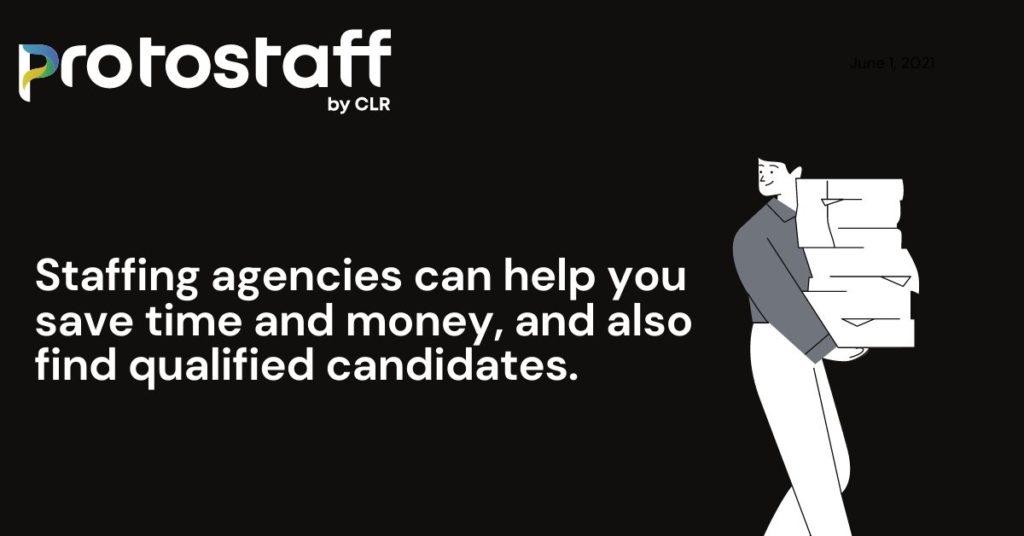- Staffing agencies act as intermediaries between workers and employers, matching qualified candidates with current job openings.
- A staffing agency is a great option for your business if you need additional labor. It can also save time and offer other benefits, such as flexibility and lower legal risk.
- Staffing agencies typically charge a markup of 25% to 100% on the employee’s wages.
- This story was written for hiring managers and business owners who have never worked in a staffing agency before but want to expand their team by partnering with one.
Many small businesses still struggle to find qualified talent. Interviewing applicants, reviewing applications and negotiating salary packages can all consume valuable time that could end up costing the business. Employers partner with staffing agencies to take the hassle out of finding qualified candidates. They also provide workers for open positions, saving time and money.
Although it is not the best choice for all businesses, there are some things you should know about working with a staffing agency to help you meet your hiring needs.
What is a staffing agency?
For businesses looking to fill specific positions, a staffing agency can help them recruit employees. If you are looking for new staff, a staffing agency can help. The process usually goes like this:
- The employer contacts a staffing agency. You’ll first need to specify information such as the job responsibilities, number of employees required, timeline for hiring new workers, and wage or salary rates.
- The job description is created by the agency. They then create a job description for you and post it. If the candidate is suitable, they may also contact the candidates directly.
- The staffing agency vets candidates: After candidates apply for an open position, the staffing company reviews their qualifications and experiences before scheduling interviews. The staffing agency then selects the best candidates to present to your hiring manager.
- The employer will make the final hiring decision. A hiring manager or business owner will interview staffing agency candidates before making a hiring decision. This saves time and reduces the amount of work you have to do sorting through hundreds of applicants.
- The agency handles all paperwork related to new hires like taxes and payroll tasks.
What can a staffing agency do for you?
Staffing agencies are a valuable resource to find the right talent fast and efficiently as employers increasingly look to freelancers, part-time and temporary workers to fill their workforce gaps. Here are some of the many benefits a staffing agency can provide your company.
Rapid hiring
The job market has seen significant changes over the last few years. Hiring is more time-consuming and difficult than ever before.
Matthew Rowles, business development manager at the staffing company Kavaliro, stated that “great talent becomes harder to locate, and it becomes extremely difficult for managers to review resumes, conduct interviews, and all while still responsible for their day to-day operations,”. It can be time-saving and cost-effective to work with a trusted staffing company. Staffing firms can help managers to prescreen and evaluate candidates so that they only interview those who are right for the job.
Flexibility
AJ Brustein is the CEO and co-founder Wonolo. He stated that many companies are putting off hiring full-time employees for a variety of reasons. Brustein stated that a focus on leaner operations is a key factor.
Brustein stated that companies are striving to be more productive and have only the workers they need when they are really needed. They need to find ways that every dollar they spend will benefit the business. They can only hire people they need, and temp staffing lets them be productive.
Jason Leverant is the chief operating officer at national staffing franchise AtWork Group. He stated that employers now realize the importance of having a flexible workforce that can be constantly adjusted to meet their hiring requirements.
Leverant stated that the flexibility of using a staffing agency was the main driver for the push to hire a workforce that could adapt to the changing needs of clients’ businesses.
Lower risk
Employers have many legal responsibilities, including the responsibility to pay certain taxes, provide insurance coverage, and follow labor laws. Both from a financial and operational perspective, hiring employees comes with risks. This is especially true if an employee has to be fired unexpectedly or leaves. The agency will assume many of these risks for you when you hire staffing firms.
Leverant stated that staffing firms are often considered to be the employer of record for temporary associates. Therefore, [staffing company clients] appreciate that the staffing firm is able to assume full responsibility for their employees while on assignment.”
What is the secret to it?
Amy White, an author of Snagajob wrote a blog post about the main types of jobs staffing agencies can help companies fill. She outlined the following: temporary (an assignment with a fixed start and end date), tempo to hire [an assignment that is initially temporary but helps an employer determine the worker’s long-term suitability with the company), and permanent (a position in which the staffing agent acts as a recruiter).
White explained how staffing companies fill vacancies. White also explained how staffing companies fill open positions if they don’t have a suitable employee. It will then accept applications, conduct interviews, and do a backgroundcheck, if necessary, as any other employer. The agency hires the candidate once they have found the right person (except for direct-hire positions). White stated that while the agency will issue the worker’s pay and benefits, the length of the employment is up to the client.
You can also sign up for online hiring platforms such as Upwork or Freelancer.com. These platforms give you access to freelance professionals who are available to work remotely. These platforms work in a slightly different way. Workers who use these platforms are independent contractors. You’ll need to pay them directly and issue a 1099 tax form at year’s end. You are not subject to any official employer obligations, such as payroll taxes, benefits, or other duties. These workers can be used, provided they are correctly classified.



